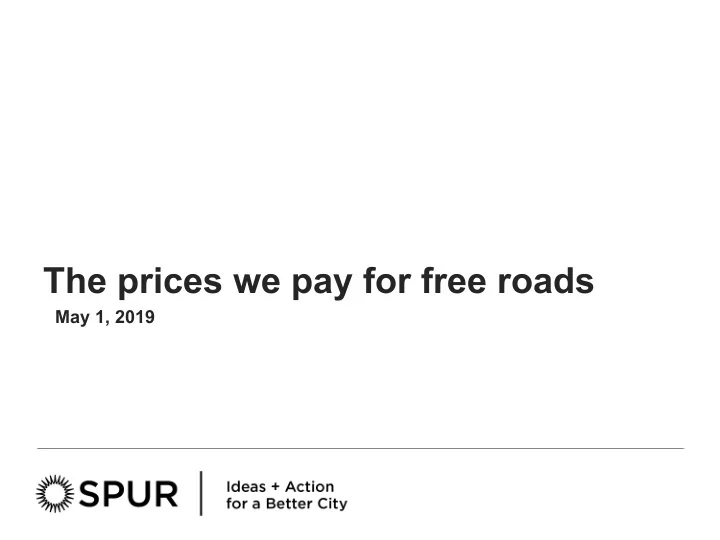

The prices we pay for free roads May 1, 2019
1. Congestion in San Francisco costs drivers over $2,000 a year in lost time. For the whole Bay Area, jobs and population have grown 7% and 14% since the late 90’s, while congested delays per worker have grown by nearly 60% 60% Congested delay per worker 50% 40% Total delay per worker 30% Population 20% 10% Jobs 0% -10% 8 9 0 1 2 3 4 5 6 7 8 9 0 1 2 3 4 0 1 9 9 0 0 0 0 0 1 1 0 0 0 0 1 1 0 0 0 0 0 0 9 9 0 0 0 0 0 0 0 0 0 2 2 2 2 1 2 2 1 2 2 2 2 2 2 2 2 2 Source: INRIX for congestion estimates: http://inrix.com/press-releases/scorecard-2017 VitalSigns for population and jobs: http://www.vitalsigns.mtc.ca.gov/data-center and for congestion metrics: http://www.vitalsigns.mtc.ca.gov/time-spent-congestion
2. Emissions from passenger cars is our region’s single biggest contribution to climate change Share of MMTCO2e for the Bay Area in 2014 Other Agriculture Residential Transportation - passenger cars Electricity Transportation - not cars Oil refineries Other industrial and commercial Source: Bay Area Air Quality Management District, Table V: Bay Area Greenhouse Gas Emission Inventory Projections : 1990 – 2029: http://www.baaqmd.gov/research-and-data/emission-inventory/maps-data-and-documents
3. Cars contribute to local air quality problems and heart and respiratory disease Source: BAAQMD, Community Air Risk Evaluation Program, 2013
4. Cars cause death and injury across all modes throughout the Bay Area
“arguing that congestion pricing isn’t fair implicitly assumes that the status quo is fair” ~ Michael Manville Current inequalities: 1. Driving externalities concentrate in disadvantaged communities 2. Current transportation funding sources are often regressive 3. Roads and driving are more heavily used by the affluent 4. Transit is more efficient but often costlier per trip than driving 5. We dedicate scarce urban space to cars instead of people
Recommend
More recommend